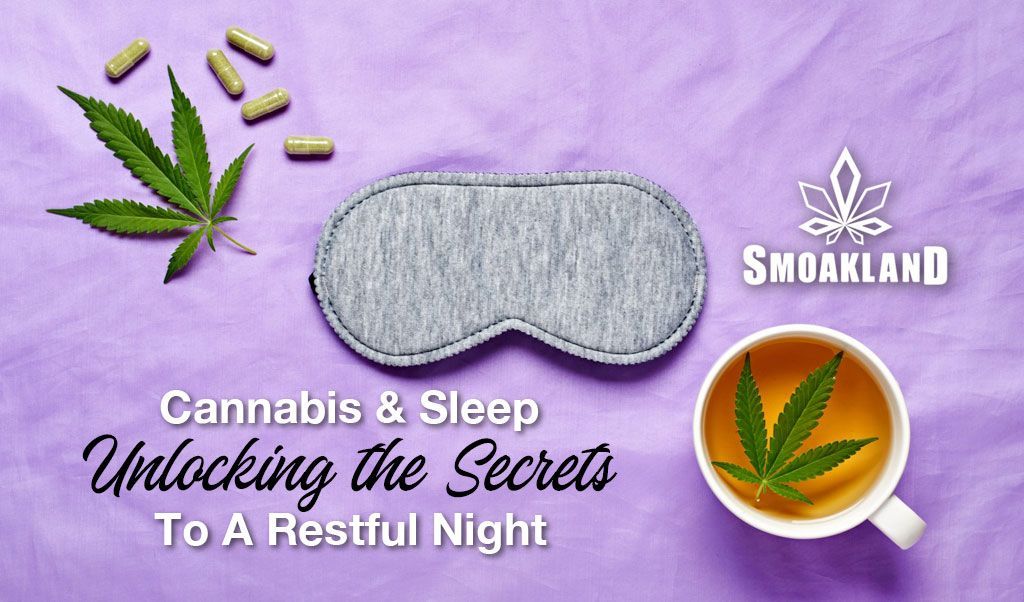Cannabis and Sleep: Unlocking the Secrets to a Restful Night
Cannabis and Sleep: Unlocking the Secrets to a Restful Night
It's understandable—falling asleep at night can be difficult. Whether one suffers from anxiety, chronic pain, or just has an overly active mind, getting good quality sleep can feel downright impossible some nights. Many have been there themselves, lying awake when they should be sleeping. It is so frustrating!
But what if it was shared that the answer to sleep issues could be cannabis ? It might come to mind that cannabis just makes some feel spaced out, hungry, or lazy on the couch binge watching TV for hours. That's definitely a side effect for some users! But with the right strain and dosage, cannabis can actually work wonders when it comes to sleep.
How Cannabis Affects Sleep
Cannabis contains dozens of active compounds called cannabinoids, the most abundant being THC and CBD. These cannabinoids exert effects by binding to receptors throughout the body's endocannabinoid system. This system regulates various processes including sleep-wake cycles. THC is known for causing cannabis' characteristic "high". It can also induce drowsiness, especially in new users. CBD lacks the intoxicating effects, but contains many therapeutic properties including encouraging longer sleep duration.
Research shows cannabis use causes longer total sleep time, shorter time to fall asleep, and increased slow wave sleep (SWS) time. SWS is the deepest sleep stage crucial for body restoration. However, THC has also been shown to suppress rapid eye movement (REM) sleep. REM disruption may explain "hangovers" some feel the next day. Therefore, an optimal balance of THC and CBD can maximize sleep benefits without next-day grogginess.
Overall, properly dosed and timed cannabis may:
-
Shorten time to fall asleep.
-
Lengthen total sleep duration.
-
Increase total SWS sleep time.
-
Avoid REM sleep suppression.
-
Reduce nighttime awakenings.
Optimizing Cannabis for Better Sleep
With thousands of cannabis strains now available, determining optimal forms, doses, and timing can be complex. However, some key best practices exist:
-
Forms and Strains : Products containing both THC and CBD tend to work best for sleep. Examples include certain Indica strains like Granddaddy Purple. CBD-dominant formulas are also widely used to improve sleep without a "high".
-
Doses : Start with very low doses of 2-5 mg THC with CBD balanced 1:1 or higher. Increase slowly as needed, but high doses are unlikely necessary.
-
Timing : Take 60-90 minutes before bedtime, allowing onset during wakeful relaxation without residual impairment into sleep. Set a routine.
-
Environment : Creating a positive setting for sleep promotes relaxation before onset, rather than direct stimulation from devices/media.
Tips for New Users
Those new to using cannabis for better sleep should consider this advice:
-
Start very low (2-5mg THC or less) and increase slowly only as needed.
-
Be patient, allowing subtle changes over weeks before changing the approach.
-
Create a consistent sleep routine around timing, environment, and sleep hygiene practices.
-
Talk to the doctor openly about plans to use cannabis for sleep assistance.
Following these simple tips can help maximize benefits while minimizing risks.
Conclusion
When used properly, cannabis can be a safer alternative or adjunct to pharmaceutical sleep aids. Small doses of strains containing both CBD and THC may improve sleep quality without residual grogginess for many people. However, effects vary based on individual body chemistry and prior exposure. Therefore, new users should start low and slow, tracking changes in a sleep diary over time. Working with a knowledgeable doctor ensures cannabis integrates into an overall sleep hygiene plan in a responsible manner optimized to your needs. If you're struggling with sleep issues, visit Smokeland for high-quality legal weed delivery in California, including CBD and Indica products well-suited for promoting sleep.
ADDITIONAL BLOGS





